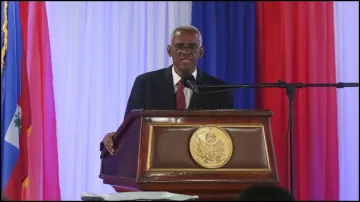Haiti's transitional council names new PM as it attempts to restore stability amid gang violence
Fritz Belizaire, who served as the Haitian sports minister from 2006 to 2011, has been chosen as the new Prime Minister days after Ariel Henry officially stepped down from the post. The transitional council aims to establish a stable government as gang violence has rocked the country since Feb 29.

Port-au-Prince: Haiti's newly-installed transitional council named a new Prime Minister on Tuesday as part of its monumental task to establish a stable new government amid skyrocketing gang violence, as heavy gunfire was reported in the capital's neighbourhoods during the council meeting. Fritz Bélizaire, the former sports minister of the country, has been named as the new Haiti PM, days after Ariel Henry resigned from the post.
Bélizaire will replace current interim Prime Minister Michel Patrick Boisvert, gaining the support of four of the seven voting members on the nine-member panel but with other panel members saying they were unfamiliar with him. The council also planned to choose a Cabinet as it seeks to quell gang violence that is choking the capital, Port-au-Prince, and beyond.
The council also chose former presidential candidate Edgard Leblanc Fils as the president of the panel. "This is a very good choice for prime minister. The important thing for us is this will, this determination to go beyond divisions, to overcome conflicts and to reach a consensus," Fils said on Bélizaire's selection as the PM, adding that the council met with army and police officials on Monday to address the security crisis in Haiti.
The shocking gang violence in the Caribbean country has caused over 90,000 to flee the capital in a month and more than 360,000 people have been left homeless in recent years as gunmen raze communities in rival territories. More than 2,500 people were killed or injured from January through March, up 53% from the last three months of 2023, recent data from the United Nations Integrated Office in Haiti (BINUH) shows.
Ariel Henry's tumultuous career and resignation
Henry officially stepped down as Haitian PM on April 25 paving the way for a transitional council to lead the country that aims to bring back peace and tranquillity to the country amid widespread gang violence. His government formalised a transition process two weeks ago, a month after Henry announced his resignation while stranded outside the country as alliances of heavily armed gangs threatened to completely take over the capital.
He became the Prime Minister in 2021 following the assassination of the country's last president, Jovenel Moise. Henry's resignation came alongside regional talks over participation in an international force, which he had requested to help police fight the gangs, whose brutal turf wars have fueled a humanitarian crisis, cut off food supplies and forced hundreds of thousands from their homes. Gangs have long opposed Henry and sought to oust him, blaming him for the deepening poverty in the country.
Gangs launched coordinated attacks on February 29, when Henry was on an official visit to Kenya to push for a UN-backed deployment of a police force, in the capital, Port-au-Prince, and surrounding areas. They burned police stations and hospitals opened fire on the main international airport that has remained closed since early March and stormed Haiti's two biggest prisons, releasing more than 4,000 inmates. Gang leader Cherizier threatened to go after hotel owners hiding politicians or collaborating with Henry.
The international community has urged the council to prioritise Haiti's widespread insecurity. Even before the attacks began, gangs already controlled 80 per cent of Port-au-Prince. The number of people killed in early 2024 was up by more than 50 per cent compared with the same period last year, according to a recent UN report.
Under international pressure and stranded in Puerto Rico, the unelected Henry announced his resignation pending the appointment of a council and temporary replacement, but the transition council was delayed amid disagreements by some of the groups putting forward representatives. Gangs have warned of a "battle" for Haiti and threatened politicians who join the transition council.
A surprise pick for new PM
Among Haitians, the announcement of Bélizaire as the new Prime Minister of Haiti was unexpected. A murmur rose through the attendees as officials announced that four council members with voting powers had selected Bélizaire as prime minister. Bélizaire served as Haiti’s sports minister during the second presidency of René Préval from 2006 to 2011.
“He’s kind of an unknown figure,” said Robert Fatton, a Haitian politics expert at the University of Virginia. “He doesn’t seem to have his own constituency. Maybe that made him the likely prime minister so different parties can accept him as prime minister.” Meanwhile, many people in the country remained unaware that a new Prime Minister had been chosen.
Haitians remain divided over whether they believe a transitional government can help calm a troubled country whose capital has been under siege since gangs launched coordinated attacks on February 29. However, the people have longed for security after decades of violence in the country. The council is expected to support the UN-backed deployment of a Kenyan police force to help fight gangs, although it’s unclear when that might happen.
(with inputs from AP)
ALSO READ | Haiti PM Ariel Henry resigns, paves way for transitional government amid widespread gang violence